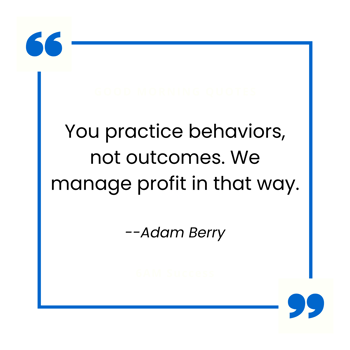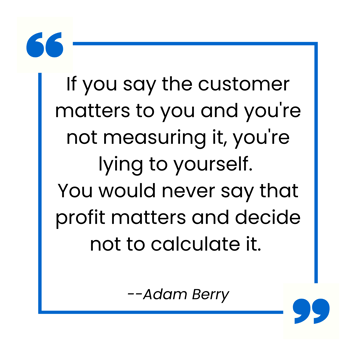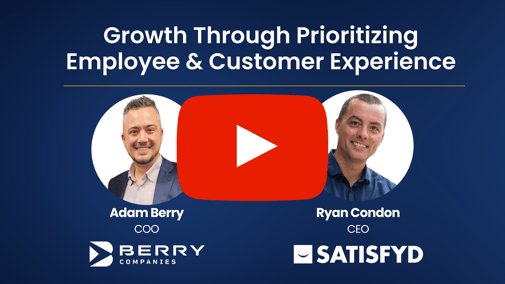About Berry Companies
Berry Companies' history dates to 1957 when Fred Berry, Jr., and his brother Paul purchased the Sam H. Denney Road Machinery Co. and renamed it Berry Tractor & Equipment Co. The Sam H. Denney Road Machinery Co. had been founded in 1928 to distribute road maintenance equipment.
In 1962, the brothers acquired White Star Machinery & Supply Co., which had been founded in 1910. Since then, Berry Companies has grown to nine divisions with over 50 branch locations operating in nine states throughout the Midwest and Southeast.
Since its inception, Berry Companies have held tightly to the values of integrity and honesty that have made the company successful.
Throughout Berry’s decades-long growth and diversification, they’ve remained a family company where employees and customers come first, making SATISFYD their partner of choice.
During the 2023 AED Summit, we had the opportunity to have a conversation with Berry Companies' COO, Adam Berry, about growth through prioritizing employee and customer experience. We invite you to watch the conversation here.
Berry shared so much valuable information packed with insights and specific action items to inspire dealerships to grow by prioritizing employee and customer experiences. Some of the highlights of the conversation are below.
Berry Companies' Insights on the
Employee and Customer Experience
Employee Experience
Founder Fred Berry's Philosophy
Fred's thinking when he got into the business was to make a Christian statement in the workplace, which can mean a lot of things to a lot of people, but what it meant to him was that it was going to be a values-driven organization that was focused around the employee experience and therefore, the customer experience.
Employees' Role in the Company
Berry's Company employees are a big part of the company. Employees own about 40% of the company through the Employee Stock Ownership Program (ESOP).
Benefits of Having Employees as Owners
- Get buy-in early on because their outcomes are going to be tied to your outcomes.
- Agency conflicts (disconnect between owners and managers) are diminished because employees know that the success of the company can become a significant portion of their retirement portfolio.
- Everybody feels they're part of a bigger thing, and they have a shared outcome together.
Downside of Having Employees as Owners
Employees could become very demanding; however, that can be prevented based on how your ESOP is structured.
Fred's Leadership Style
It was inspired by Theory X and Theory Y. Theory X is the traditional standard model, the authoritative approach is command and control, and Theory Y is the participative approach.
Theory Y is about giving freedom, but providing guidance and clear direction on the expected outcome, but you give freedom to achieve it how you want. Fred gravitated to this type of theory assuming that you're going to make more mistakes, but we're going to get better outcomes in the long run.
Profitability at Berry Companies
It's important, but it is not the most important aspect of our business. Profit is required to have a long-term sustainable growth, but there are other things that go along with profit. In our vision statement, we say that will sacrifice short-term gains for long-term rewards at every opportunity. And our profit motive is also built around sharing with our people and sharing it with our communities. And that's really important.
Berry Companies' Approach to Profit
Profits are like the scoreboard. You look at the scoreboard, and it tells you whether or not you won, but you don't manage it. You don't go back after practice after losing a game and say, well, today we're going to practice scoring more points. That's not the way a good coach goes. A good coach goes back and says, we're going to practice passing and dribbling, shooting and free throws.
We manage the behaviors that we want to see; for example, better communication. Profits are certainly the outcome, but there are other things that you have to keep in line first.
Culture Framework
When we talk about employee and customer experience, we would summarize that all in one thing: culture.
We use a framework that I think is really useful and valuable from a famous book, The Flywheel, by Jim Collins. It's not really that novel of a concept. It's really just a virtuous cycle or network effects. Google's the famous one. You search Google because it gives you great results, and every person who searches Google gives Google better results. And so the more people who search for better results, which means more people will search it and it just builds on itself. And that's the flywheel, that concept.
Berry Companies' Flywheel
Berry Companies' flywheel starts with employees and the employee experience because if we give employees a great experience and they love what they're doing, they're going to turn that into a great customer experience. A great customer experience is going to be turned into a long-term customer relationship. That's going to be turned into good, profitable results, which is going to be turned into reinvestment into the company, mostly in our people, also in infrastructure, buildings, etc., so that is our cycle.
Berry's Advice on How to Get Started
It would be to start with the vision or mission statements. If you don't have one, you certainly need one.
If it's not written down, it's not real. When it's on paper and you can point to it, it becomes real and becomes something we should all do together. So I would start with a vision statement, but be careful. Don't get too aspirational. If you say this is who we are, and that's not who you are, people aren't going to buy in because they're saying that's not. It must be yours. It has to be tied into who you want to be and how you do business to how you want your employees to be. It’s got to be personalized.
Perspective about the Younger Generation
There are a lot of good things about how the younger generation thinks; however, there are a lot of negativity perceptions out there. It's less about these the younger generation being that different and more just about people changing as they move through age.
The fact that the younger generation has life easier than you doesn't mean they're lazy and it doesn't mean they’re allergic to hard work. They are capable. They just care about different things:
- They're extremely morally focused.
- They want the companies they work for to have a purpose that’s bigger than just profit.
- They're looking for a place where they can build connection, not just a place that they can show up and do a job.
Berry's Approach to Accommodate to the Younger Generation:
- Flexibility would certainly be one of those things where we can provide it
- A lot more feedback that we're historically used to. We're constantly talking with them, checking in with them, giving them the feedback that they want.
- Autonomy. They want you to let them figure out how to do it. And that means they're going to fail and some of them won't do anything and you'll have to fire those people. But you do. Giving them that autonomy and have to work it through a couple of people is going to be a better long term outcome.
Approach with Employees Who Want to Go Back to School
- Always be supportive.
- Encourage them to research the facts on their own.
- Make sure they know the other side of that equation, which is if you want to go back to school, do it. But it's hard work. It takes time, it takes money.
- Walk them through the earning forecast of the two scenarios and make sure to include raises and company benefits.
Customer Experience
Know what type of customer experience you want to give, and the key is that you communicate often about what your expectations are, so you have to train your people on the customer service experience.
We do customer service training for every employee, even the ones that aren't customer facing, including technicians for example. The reason we do that is that we want every employee to know what the expectation is, even if we don't necessarily expect it from them on a daily basis. We need them to know what the institutional expectation is. So certainly customer service training.
The flywheel is also present here. If you treat the employees right and they're having a good experience, they're going to be more likely to treat customers right.
Autonomy
We let the decision maker closest to the problem make the call. And we think that that's really helpful for customers. We don't want to have ton a of policies. That doesn't mean we don't have rules and things that we live by. We do have frameworks that we live by:
- The person with the best knowledge to make that call is going to be the person in front of the customer.
- We try to avoid the 'I don't know, you got to talk to our boss' type of situation.
- When it comes time to talk to the customer, the employee with the relationship with the customer is the one having the conversation.
- We give that decision-maker access to the person dealing with it in that situation.
How do you measure the customer experience today?
We do customer surveys through this company called SATISFYD. We do customer surveys in every division, every branch, every department. That's really important for us to be able to compare what those results are, and there are plenty of takeaways.
Most of those takeaways are actually really localized, so it's more about 'I have a problem with this guy or girl in this branch, in this department that may not be giving a customer a great experience.' And generally in those--a people change is what's necessary. It has highlighted some kind of higher-level structural changes, like parts inventory availability has certainly been a problem this last year that has showed up in our customer satisfaction numbers.
We can see in the surveys that communication in the service department is what matters. It matters more than price, and matters more than fixing it right. They want to know what the heck's going on, how long it's going to be. They want you to call them so we can see that showing up in the data as well.
Why A Customer Experience Platform Now and Why SATISFYD?
If you say the customer matters to you and you're not measuring it, you're lying to yourself. I don't mean to be rude, but that that's a fact. You would never say that profit matters and decide not to calculate it. If you did, that would be kind of crazy.
So you should measure it. And we didn't measure it for a long time. Like if I was up here on stage a year ago, I would have been one of the people going, 'Yeah, I don't consistently measure. I think I know my customers think well of me, but I don't know. I haven't done anything about it.' So I think you've got to consistently measure it and measure it over time to know where you're at and how you compare it to benchmarks or standards.
So what does SATISFYD or any company like SATISFYD offer? We think SATISFYD offers it better. They're going to offer you that benchmarking. So there are other people in the industry. They know what the averages are. They know kind of what your expectations should be about the outcomes of the individual metrics. They have the methodology down pat, and they customize the plan for us.
We were really worried about whether we were going to annoy all our customers by calling them all the time, and that's a valid concern. And so we wanted to balance statistical significance with annoying our customers, and SATISFYD worked with us to do that. SATISFYD is also very passionate about what they do, and that passion shows up in the results.
I think that makes SATISFYD an easy choice. But in general, if you say customer experience is important, you have to measure it. And if it's not important, that's okay too. You just have to decide what is important to go with that in your vision statement. But if it is important to you, measure it. Want to See SATISFYD's Products in Action? Let's connect!

Feb 17, 2023 7:56:59 AM
